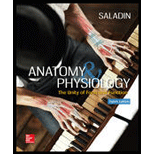
CRH secretion would not raise the blood concentration of
- a. ACTH.
- b. thyroxine.
- c. cortisol.
- d. corticosterone.
- e. glucose.
Introduction:
The hypothalamus synthesizes the releasing hormones and inhibitory hormones which control secretion or inhibition of hormones by the anterior pituitary. The hypothalamus secretes six hormones namely thyrotropin-releasing hormone (TRH), gonadotropin-releasing hormone (GnRH), prolactin-inhibiting hormone (PIH), corticotropin-releasing hormone (CRH), growth hormone–releasing hormone (GHRH), and somatostatin. These hormones regulate the synthesis of pituitary hormones (FSH, LH, TSH, ACTH, prolactin, and GH). The pituitary hormones control other endocrine glands.
Answer to Problem 1TYR
Correct answer:
Corticotropin-releasing hormone (CRH) secreted by the hypothalamus would not raise the thyroxine concentration in the blood. Thyrotropin-releasing hormone (TRH) from the hypothalamus promotes the release of thyroxine from the thyroid gland. Therefore, option b is correct.
Explanation of Solution
Justify reasons for the correct statement:
The thyroid follicular cells secrete thyroid hormones (TH) such as triiodothyronine (T3) and thyroxine (T4). The thyroid gland releases TH into the bloodstream. The secretion of thyroxine is not influenced by the CRH.
Option (b) is given as “thyroxine”.
CRH does not raise the thyroxine concentration in the blood.
Hence, option (b) is correct.
Justify reasons for the incorrect statements:
Option (a) is given as “ACTH”.
The hypothalamus releases the CRH, which stimulates the anterior pituitary to secrete adrenocorticotropic hormone (ACTH). Hence, it is a wrong answer.
Option (c) is given as “cortisol”.
CRH stimulates ACTH secretion by the anterior pituitary. ACTH promotes the adrenal cortex to release of cortisol (glucocorticoids). Hence, it is a wrong answer.
Option (d) is given as “corticosterone”.
CRH stimulates ACTH secretion by the anterior pituitary. ACTH promotes the adrenal cortex to release the corticosterone (glucocorticoids). Hence, it is a wrong answer.
Option (e) is given as “glucose”.
The hypothalamus secretes the CRH that stimulates the release of ACTH by the anterior pituitary. ACTH stimulates the adrenal cortex to secrete cortisol and corticosterone (glucocorticoids). Cortisol and corticosterone stimulate the catabolism of fat and protein and promote gluconeogenesis. Thereby, they increase glucose concentration into the blood. Hence, it is a wrong answer.
Hence, options (a), (c), (d), and (e) are incorrect.
CRH raises the concentration of ACTH, cortisol, corticosterone, and glucose in the blood, but not thyroxine.
Want to see more full solutions like this?
Chapter 17 Solutions
Anatomy & Physiology: The Unity of Form and Function
Additional Science Textbook Solutions
General, Organic, and Biological Chemistry - 4th edition
Microbiology Fundamentals: A Clinical Approach
Human Physiology: An Integrated Approach (8th Edition)
Physical Science
Laboratory Manual For Human Anatomy & Physiology
- A hormone travels freely in the blood, without a binding protein. You can immediately conclude that this hormone is NOT... a. ADH b. Calcitonin c.FSH d.cortisol e.Oxytocinarrow_forwardWhich of the following does NOT produce hormones? a.Adrenal medulla b.Stomach. c.Liver. d.pancreas. e.Posterior pituitary.arrow_forwardWhich of these is not a means by which hormones are eliminatedfrom the circulatory system?a. excreted into urine or bileb. bound to binding proteinsc. enzymatically degraded in the blood (metabolism)d. actively transported into cellse. conjugated with sulfate or glucuronic acidarrow_forward
- Hashimoto's Thyroiditis is an autoimmune disease that... a.A patient would experience heat intolerance b.Can be treated with antithyroid drugs c.Results in overactive parathyroid glands d.Involves the creation of antibodies which activate TSH receptors e.Shows high plasma levels of TSHarrow_forwardCushing syndrome and Addison disease are associated with thea. thyroid. b. adrenal glands. c. pancreas.d. anterior pituitary.arrow_forwardBoth the _____ are involved in the synthesis of calcitriol and erythropoietin. a. anterior and posterior pituitary b. thyroid gland and thymus c. liver and kidneys d. parathyroids and pancreatic islets e. epidermis and liverarrow_forward
- Glucocorticoids (cortisol)a. increase the breakdown of lipids.b. increase the breakdown of proteins.c. increase blood glucose levels.d. decrease inflammation.e. All of these are correctarrow_forwardWhich of the following statements about epinephrine and cortisol is CORRECT? Select one: a. They trigger an inflammatory response. b. They are water soluble hormones. c. They promote adrenocorticotropin (ACTH) secretion. d. The plasma half-life of epinephrine is longer than cortisol. e. They increase blood glucose levels.arrow_forwardA hormone travels freely in the blood, without a binding protein. You can immediately conclude that this hormone is NOT... Multiple choices A. Calcitonin B. Oxytocin C. FSH D. cortisol E. ADHarrow_forward
- Choose the statement that most accurately predicts the long-term effectof exposure to a substance that prevents the active transport of iodideby the thyroid gland.a. Large amounts of T3 and T4 accumulate within the thyroid follicles,but little is released.b. The person exhibits hypothyroidism.c. The anterior pituitary secretes smaller amounts of TSH.d. The circulating levels of T3 and T4 increase.arrow_forwardThe formation and release of hormones from a cell or structure is calleda. digestion.b. excretion.c. synthesis.d. secretion.arrow_forwardWhich of these endocrine glands is most directly involved in immune function? a. the pancreas b. the thymus c. the adenohypophysis d. the adrenal glands e. the thyroid glandarrow_forward
 Human Anatomy & Physiology (11th Edition)BiologyISBN:9780134580999Author:Elaine N. Marieb, Katja N. HoehnPublisher:PEARSON
Human Anatomy & Physiology (11th Edition)BiologyISBN:9780134580999Author:Elaine N. Marieb, Katja N. HoehnPublisher:PEARSON Biology 2eBiologyISBN:9781947172517Author:Matthew Douglas, Jung Choi, Mary Ann ClarkPublisher:OpenStax
Biology 2eBiologyISBN:9781947172517Author:Matthew Douglas, Jung Choi, Mary Ann ClarkPublisher:OpenStax Anatomy & PhysiologyBiologyISBN:9781259398629Author:McKinley, Michael P., O'loughlin, Valerie Dean, Bidle, Theresa StouterPublisher:Mcgraw Hill Education,
Anatomy & PhysiologyBiologyISBN:9781259398629Author:McKinley, Michael P., O'loughlin, Valerie Dean, Bidle, Theresa StouterPublisher:Mcgraw Hill Education, Molecular Biology of the Cell (Sixth Edition)BiologyISBN:9780815344322Author:Bruce Alberts, Alexander D. Johnson, Julian Lewis, David Morgan, Martin Raff, Keith Roberts, Peter WalterPublisher:W. W. Norton & Company
Molecular Biology of the Cell (Sixth Edition)BiologyISBN:9780815344322Author:Bruce Alberts, Alexander D. Johnson, Julian Lewis, David Morgan, Martin Raff, Keith Roberts, Peter WalterPublisher:W. W. Norton & Company Laboratory Manual For Human Anatomy & PhysiologyBiologyISBN:9781260159363Author:Martin, Terry R., Prentice-craver, CynthiaPublisher:McGraw-Hill Publishing Co.
Laboratory Manual For Human Anatomy & PhysiologyBiologyISBN:9781260159363Author:Martin, Terry R., Prentice-craver, CynthiaPublisher:McGraw-Hill Publishing Co. Inquiry Into Life (16th Edition)BiologyISBN:9781260231700Author:Sylvia S. Mader, Michael WindelspechtPublisher:McGraw Hill Education
Inquiry Into Life (16th Edition)BiologyISBN:9781260231700Author:Sylvia S. Mader, Michael WindelspechtPublisher:McGraw Hill Education





